|
|
|
Sort Order |
|
|
|
Items / Page
|
|
|
|
|
|
|
| Srl | Item |
| 1 |
ID:
081058
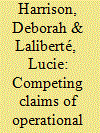

|
|
|
|
|
| Publication |
2008.
|
| Summary/Abstract |
This article explores the tension between military objectives and the "democracy value" cherished by Western civilian societies, using the situations of injured military members and the living conditions of civilian spouses; in particular, the responses of the Canadian Forces to members' posttraumatic stress disorder, and to spouses who are victims of domestic violence. The authors show how these responses currently privilege military objectives over the democracy value to an extent that is incompatible with the human rights of civilians or military members. They conclude by discussing how military leadership training could be modified to produce an altered balance between the two value systems
|
|
|
|
|
|
|
|
|
|
|
|
|
|
|
|
| 2 |
ID:
081066


|
|
|
|
|
| Publication |
2008.
|
| Summary/Abstract |
This article asks what impact, if any, the "don't ask, don't tell" policy might have on the U.S. military's reputation. Original empirical research is presented to suggest that the policy harms the military's reputation in four ways: the policy is inconsistent with public opinion, it prompts many journalists to criticize the armed forces while attracting almost no favorable media coverage, it provides a vehicle for antimilitary protesters to portray military culture as conflicting with widely accepted civilian values, and it is inconsistent with the views of junior enlisted service members
|
|
|
|
|
|
|
|
|
|
|
|
|
|
|
|
| 3 |
ID:
081067
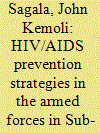

|
|
|
|
|
| Publication |
2008.
|
| Summary/Abstract |
The objective of this study is to highlight and review literature and current practices on HIV/AIDS prevention and education in African militaries. It examines the potential implications of HIV/AIDS on military effectiveness; the historical link between soldiers, war, and infectious diseases; and the problem of HIV/AIDS and African military forces. The study also reviews literature on worldwide military HIV prevention and education programs, including studies conducted in Africa. It highlights various strategies put in place by African militaries and the contributions of the U.S. Department of Defense HIV/AIDS Prevention Program and UNAIDS-Department of Peacekeeping Operations. These agencies supplement the efforts of African governments in implementing effective military HIV prevention, education, and surveillance programs. The study concludes with calls for further research on HIV/AIDS prevention strategies and African militaries.
|
|
|
|
|
|
|
|
|
|
|
|
|
|
|
|
| 4 |
ID:
081059
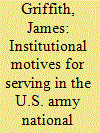

|
|
|
|
|
| Publication |
2008.
|
| Summary/Abstract |
The present study extended recent investigations of the motivations of American youth and active-duty soldiers to serve in the military. Unlike previous studies, this study employed a sample of reservists and examined their reasons for joining. Consistent with recent studies, institutionally-motivated soldiers were more likely to plan to remain in military service, would report for duty so they did not let their buddies and family down, and believed in the mission and service to the country. In contrast, materially-motivated soldiers were less likely to remain in reserve military service if deployed overseas, more likely to report for duty to meet contractual obligations and to avoid disciplinary actions, but less likely to report to serve the country. These factors have implications for the level of commitment and combat readiness of soldiers, in particular Army reservists, who are increasingly relied on for national defense strategy.
|
|
|
|
|
|
|
|
|
|
|
|
|
|
|
|
| 5 |
ID:
081051
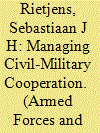

|
|
|
|
|
| Summary/Abstract |
From a management perspective, this article presents a process model to analyze cooperation between military and civilian actors in peace support operations. By means of multiple case study research, the article applies the model to eight partnerships between the Dutch Provincial Reconstruction Team and civilian actors (nongovernmental organizations, district governors, local constructors) in Baghlan, Afghanistan. These partnerships include explosives removal, power plant construction and police training courses. The article shows that civil-military cooperation processes follow six successive steps: decision to cooperate, partner selection, design, implementation, transfer of tasks and responsibilities, and evaluation. It is concluded that there is a lack of unambiguous and useful military guidelines regarding civil-military cooperation; the military are often unaware of other actors operating in the area and their programs, cooperation is frequently supply-based rather than demand-driven, and many military personnel involved in civil-military cooperation have little experience with and training in the subject
|
|
|
|
|
|
|
|
|
|
|
|
|
|
|
|
| 6 |
ID:
081068
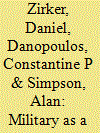

|
|
|
|
|
| Summary/Abstract |
Culture, identity, and ethnicity are central to understanding political behavior and the complex questions of military behavior in developing countries. Drawing on distinctive military periods in Fiji, Pakistan, and Uganda, each of which exemplifies, respectively, the main elements of the three schools of thought regarding ethnicity-primordialist, instrumentalist, and constructivist-this study argues that the fundamental behavior patterns associated with ethnicity relate directly to the problems and promises of military establishments in developing countries. By recognizing and understanding the dynamics of the culture of identity, military establishments in new political systems may better understand their own ethnic or "quasi-ethnic" politics. As developing military establishments build a quasi-ethnic identity, this will reinforce the growth of nationalism, which, in an age of ethnicity, would seem to posit a direct threat to democracy
|
|
|
|
|
|
|
|
|
|
|
|
|
|
|
|
| 7 |
ID:
081060


|
|
|
|
|
| Publication |
2008.
|
| Summary/Abstract |
The change from Yeltsin to Putin has had minimal effect on Russian military corruption. Putin, despite his desire to rebuild Russian strength, has not shown himself willing or able to seriously deal with this problem. The fluctuations in the level of military corruption in the post-Soviet period seem largely to be explained by changes in availability of things to steal or embezzle. Thus, the latter years' substantial increases in defense spending have been accompanied by a steep rise in military corruption. Today, Russian military corruption is one of the main obstacles to military reform in Russia and to Russia serving as a partner in international military cooperation. It might also make the traditionally pro-military Russian public loose faith in the country's armed forces
|
|
|
|
|
|
|
|
|
|
|
|
|
|
|
|
|
|
|
|
|